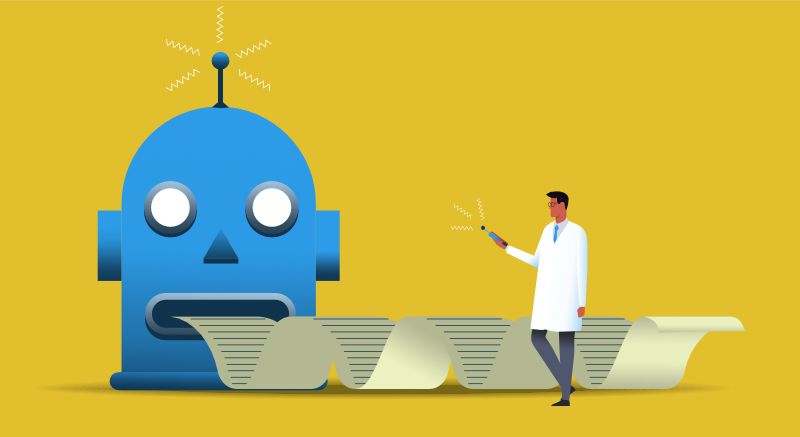AI Can Be As Stupid as You Want It To Be
Google, Microsoft, IBM, Shopify, Tesla, and OpenAI are marveling at AI. AI has been the buzz of Silicon Valley for the last two decades. With ChatGPT-like generative AI, there has been a revolutionary breakthrough in the capabilities of AI and people like you harnessing AI. Suddenly, I sound like Sundar Pichai in the latest Google I/O.
In a recent media briefing hosted by Ethnic Media Services, experts imply that generative AI is the new industrial revolution or the Dotcom boom. Experts demystify theories about AI being able to take over humans and highlight the need for societal/educational changes for proper AI adoption. Hence, the fitting title of this article: AI Can Be as Stupid as You Want It To Be.
Speakers

- Hector Palacios, Research Scientist at ServiceNow Research. He works on fundamental and applied research on Artificial Intelligence (AI), on the intersection of reasoning and machine learning (ML)
- Chris Dede, Senior Research Fellow, Harvard Graduate School of Education and Associate Director of Research for the National AI Institute for Adult Learning and Online Education
- Sean McGregor, a Machine Learning PhD, Founder of the Responsible AI Collaborative, lead technical consultant for the IBM Watson AI XPRIZE and developer of the AI Incident Database
With many fearing the rise of AI as a threat to humankind, we are sold this dystopian viewpoint by movies like Terminator or I, Robot. AI experts claim that we aren’t seeing the genesis of Skynet, AI is not here to steal our jobs, and we won’t be under the governance of AI.
Experts start by highlighting that generative AI is essentially a language model tied to a program. It is a mere reflection of what is available on the internet and uses data from the internet to perform actions we users dictate. AI doesn’t have a comprehensive understanding of human language. After all, for computers, it is just a bunch of numbers and symbols.
The best way to depict this is Star Trek. Dr. Dede alludes to Star Trek’s ‘Captain Picard’ and ‘Data’ a droid based on AI. “Data is capable of absorbing enormous amounts of data in a matter of seconds, and doing what’s called reckoning, which is calculative prediction. Captain Pickard has sort of judgment-applied wisdom, and so he’s the one that’s in charge of the starship, and he uses Data’s calculative predictions to help him make good decisions.”
Putting this reference in a real-life context, Dr. Dede highlights that oncologists also use AI to research effective and innovative cancer treatments. “[AI] can scan every morning 1,500 medical journals online and see if there’s something new about the treatment of a particular patient. It can scan medical records worldwide of similar patients undergoing a variety of treatments and get advice about what’s working and what’s not working.”
While AI can peruse 1,500 medical journals for new treatments, it wouldn’t be able to take in the anthropological context of a given scenario. That is where the doctor comes in. Dr. Dede says, “The doctor knows about pain and death. The doctor understands that some people want quality of life and other people want quantity of life. It understands that cultures have different points of view about death. The different spiritual traditions have different points of view about death. The death effects on family as well as an individual and so on and so on. AI does not understand any of those things.”
Both Dr. Dede and research scientist Hector Palacios reiterate that AI is simply a program running on learning language models. Palacios breaks down the technology behind AI. “It is basically computing vast amounts of data and providing an output based on its computation. The first things to keep in mind is that this is just software right. It’s a program and this is another kind of language… All of these things come from mathematics and they’re from mathematics of computing…”
Dr. Dede simply says that AI is “alien intelligence” and its function for humans is a tool for “intelligence augmentation.” Following the Star Trek reference, humans can harness the power of AI to advance society. Dr. Dede says that a symbiotic relationship between humans and AI would allow humans to prosper. They are both co-dependent on each other’s intelligence to be able to achieve the unachievable. AI by itself wouldn’t be able to do things humans can and humans wouldn’t be able to reach their potential without AI.
To give an example, Dr. Dede talks about the simplification of redundant processes at work and the need for humans when AI starts playing a more prominent function. Dr. Dede says, “So, at the start of the spring semester in my online course at Harvard, I spent 5 minutes talking to students about generative AI and I said, ‘You can use generative AI, and if you’re smart about it, we’re not going to be able to tell.’”However, use the same tactic for a job interview and you reap what you sow. “If your marketing plan isn’t a lot better than what comes out of the AI, you’re not going to get hired.”
There is a lot of excitement behind AI. We have seen it for decades but now it has taken a more solidified format with the face of ChatGPT. AI is essentially a mirror of society and reflects whatever is available on the internet, in a more comprehensive format. As experts describe this as the next technological revolution, ML PhD Sean McGregor says, “Many things are going to happen with the AI revolution and probably the biggest surprises are going to come in the small details.”
So it comes to who stays in the driver’s seat. Either humans can harness this powerful tool and use it to our advantage or we can become victims of our own creation and regret not inflecting fast enough. The choice, is ultimately, ours.


